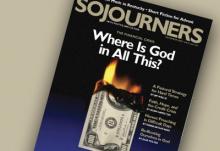Money
As per usual, on Friday, we had all sorts of Buy Nothing Day festivities (check out the video here). But that's not what I want to talk about.
The day after Thanksgiving, thousands of Americans head for the shopping malls for a ritual known as Black Friday, called such as it's a day when many retailers move from the red (losses) into the black (gains).
Black Friday is "celebrated" nationwide by working off Thanksgiving's meal by shopping. Over a decade ago another celebration was started on the same day: Buy Nothing Day.
A telling word emerged in commentary about the collapse of the financial markets this fall—greed. It’s an old concept, and one with deep moral roots. Even venerable establishment economists such as Robert Samuelson said, “Greed and fear, which routinely govern financial markets, have seeded this global crisis. ... short-term rewards blinded them to the long-term dangers.”
The people on top of the American economy get rich whether they make good or bad business decisions, but their bad choices always make workers and consumers suffer. Prudent investment has been replaced with reckless financial gambling, creating what some have called a “casino economy,” where Wall Street high rollers absorb the winnings while leaving catastrophic risks to be borne—as now—by everyone in the economy. And the inordinate level of benefits accruing to top CEOs and financial managers—especially as the wages of average workers continue to decline—has become one of the greatest moral travesties of our time.
In the search for blame, some say greed and some say deregulation. Both are right. The financial collapse of Wall Street is the fiscal consequence of the economic philosophy that now governs America—that markets are always good and government is always bad. But it is also the moral consequence of greed, where private profit prevails over the concept of the common good. The American economy is often rooted in unbridled materialism, a culture that continues to extol greed, a false standard of values that puts short-term profits over societal health, and a distorted calculus that measures human worth by personal income instead of character, integrity, and generosity.
The conversation we have on God's Politics can be very intense.
The work of loving mercy, seeking justice, and walking humbly can be pretty merciless, ruthless, and humiliating. The recent financial meltdown has only increased the national and global anxiety.
